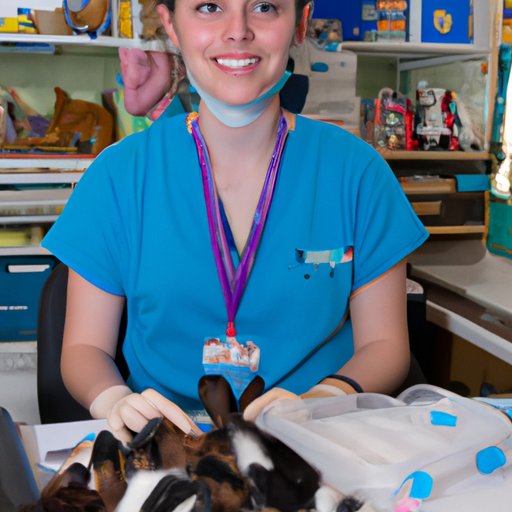Introduction
A veterinary technician (or vet tech) is a professional who works alongside veterinarians to provide medical care to animals. Vet techs are responsible for providing assistance with diagnoses and treatments, taking vital signs, preparing and administering medications, assisting with surgery, and providing patient care. They also perform laboratory tests and collect samples for examination, as well as educate pet owners about preventive health care.
Educational and Licensing Requirements
In order to become a vet tech, individuals must have a working knowledge of animal anatomy, physiology, nutrition, and other related sciences. Most states require that vet techs complete a two- or four-year veterinary technology program at an accredited college. Upon completion of the program, most states require that vet techs become licensed by passing the Veterinary Technician National Exam (VTNE).
According to a survey conducted by the National Association of Veterinary Technicians in America (NAVTA), “90% of respondents reported that they had successfully completed their VTNE on the first attempt.” This suggests that individuals who complete a veterinary technology program have a high likelihood of passing the exam and becoming licensed.
Job Opportunities
Vet techs can find employment in a variety of settings, including private veterinary practices, animal shelters, research laboratories, zoos, and humane societies. According to the Bureau of Labor Statistics, the median annual wage for vet techs was $34,420 in 2019, and the job outlook for vet techs is expected to grow 19% from 2019 to 2029, much faster than the average for all occupations.

Skills Necessary to be Successful
Successful vet techs must possess strong technical, communication, and interpersonal skills. Technical skills include the ability to recognize and respond to different animal behaviors, administer medication, and understand medical terminology. Communication skills are important for accurately conveying information to colleagues, clients, and pet owners. Finally, interpersonal skills are essential for developing relationships with colleagues, clients, and pets.
Staying Up-To-Date on Veterinary Technology Advances
In addition to the educational and licensing requirements, vet techs must stay up-to-date on advances in veterinary technology. Many states require continuing education credits for vet techs to maintain their licensure. Additionally, vet techs should keep abreast of relevant industry news by reading publications such as Veterinary Technician Magazine and attending conferences and seminars.

Building Relationships with Clients and Pets
Vet techs must also be able to build relationships with clients and pets. It is important to understand the human-animal bond and develop an approachable personality. Vet techs should strive to make clients feel comfortable and ensure that their pets receive the best possible care.
Self-Care when Working with Animals
Working with animals can be emotionally and physically demanding. Vet techs should understand the signs of stress and practice self-care techniques, such as taking breaks, engaging in relaxation activities, and talking to friends and family. It is also important to seek support from colleagues and supervisors when needed.
Volunteering at Veterinary Clinics or Shelters
Finally, vet techs should consider volunteering at veterinary clinics or animal shelters. Volunteering provides an opportunity to gain experience, network with professionals, and learn more about animal behavior and care. Additionally, it can be a rewarding way to give back to the community.
Conclusion
Becoming a vet tech requires dedication, hard work, and commitment. Individuals must meet educational and licensing requirements and develop the necessary technical, communication, and interpersonal skills. Additionally, vet techs must stay up-to-date on advances in veterinary technology and build relationships with clients and pets. Finally, volunteering at veterinary clinics and shelters can be a great way to gain valuable experience. If you have the desire to help animals and the commitment to pursue a career in vet tech, then you have what it takes to succeed.
(Note: Is this article not meeting your expectations? Do you have knowledge or insights to share? Unlock new opportunities and expand your reach by joining our authors team. Click Registration to join us and share your expertise with our readers.)
